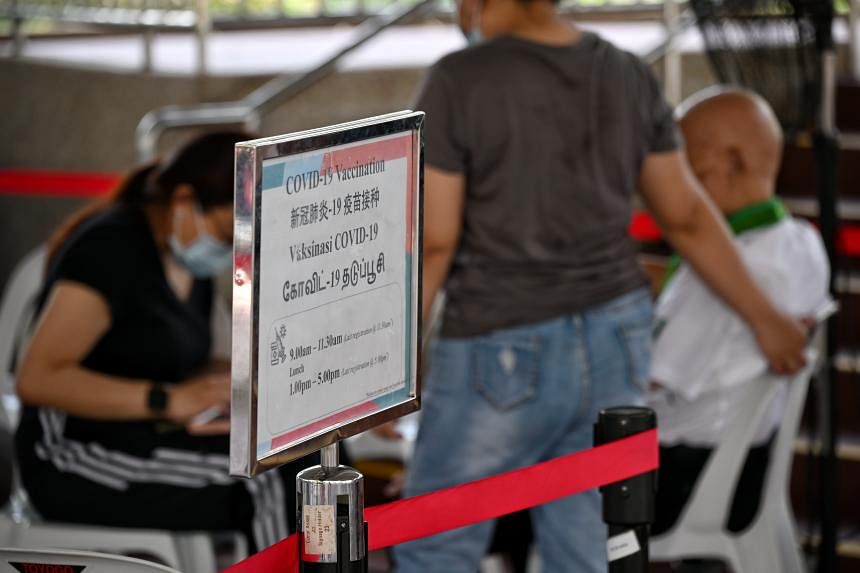- Joined
- Jul 14, 2008
- Messages
- 89,898
- Points
- 113
from straitstimes.com:

Health Minister Ong Ye Kung said his ministry is working on increasing the cohort intake in local nursing schools. ST PHOTO: AZMI ATHNI

Judith Tan
Correspondent
UPDATED
JUL 12, 2024, 06:10 PM
FacebookTelegram
SINGAPORE - Local tertiary institutions are launching new courses in 2024 to improve the education and training of nurses, even as the Health Ministry is working with them to create opportunities for nurses to enhance their skills and continue learning throughout their career.
The ministry is also working to increase cohort sizes in the nursing schools at the Institute of Technical Education (ITE), polytechnics and universities, said Health Minister Ong Ye Kung at the 2024 Nurses’ Merit Award ceremony on July 12.
“It cannot be a big jump, but it should be an addition that help fulfil the wishes of our students who want to become nurses. Even so, it will continue to be an attractive and competitive course of study,” he said.
The National University of Singapore (NUS) will be launching two new postgraduate programmes in August.
The graduate certificates in Integrated Health and Critical Care Nursing are work-study programmes, which could take between 1½ years and 4½ years to complete. They give nurses the opportunity to develop their professional competencies through on-the-job training at the workplace, while concurrently advancing their professional development.
To nurture a practice-ready nursing workforce, the Singapore Institute of Technology (SIT) is starting in September a new five-year integrated Bachelor of Science in Nursing – Master of Science in Nursing programme.
Graduates from the three-year bachelor’s programme are able to work as registered nurses, or they may choose to pursue the two-year work-study master’s programme for further training in one of four specialisations: medical or surgical; high acuity care, which is short-term care provided to patients who need special supervision while recovering from a serious illness or injury; intermediate care; and long-term care.
In October, a three-year work-study diploma in nursing will begin at the ITE, giving enrolled nurses who are working the opportunity to obtain a nationally recognised diploma and take on more complex nursing tasks as registered nurses.
ITE has already replaced its two-year National ITE Certification (Nitec) in Nursing programme with a three-year Higher Nitec, which enhances the capabilities and knowledge of enrolled nurses to undertake an expanded scope of practice.
Mr Ong told healthcare professionals at the ceremony to never believe the assertion that nobody wants to join nursing.
He said about one in 25 students will end up studying nursing, and every year during application season, he and other Members of Parliament get numerous appeals from Singaporeans who want to get into nursing but could not.
“Last year, we set a national target to hire 4,000 new nurses, after experiencing high attrition in 2021 and 2022 due to Covid-19 (when) many of our nurses were poached. We have since turned the tide,” he said.
About 4,500 nurses were newly registered in the public healthcare clusters in 2023 and they comprised “both a strong local core, as well as foreign nurses”.
Mr Ong also said the public healthcare clusters’ nursing annual attrition rate has gone back to pre-Covid levels of around seven per cent, which he called “a healthy level”.
Apart from bolstering formal education, Mr Ong said the training of nurses in primary care has taken on greater importance, especially with preventive care and Healthier SG being key thrusts of Singapore’s long-term healthcare plans.
He lauded Nurses’ Merit Award recipient Marine Chioh, Assistant Director of the Primary and Community Care Development Division at the Agency for Integrated Care (AIC), who was “instrumental in developing the role of nurses working in the Primary Care Network (PCN) setting”.

Nurses’ Merit Award recipient Marine Chioh, Assistant Director, Primary & Community Care Development Division, Agency for Integrated Care, worked with GPs and nurses to set up the training framework and competency roadmaps for the Primary Care Network. She is a nurse by training. ST PHOTO: AZMI ATHNI The Straits Times
PCN is a network of GPs supported by nurses and care coordinators which provides holistic and coordinated care to patients with chronic conditions such as diabetes, hypertension and high cholesterol. This team-based care approach ensures patients are better cared for in the community.
A nurse by training, Ms Chioh, 62, was seconded from AIC in 2012 to work with general practitioners (GPs) in private practice on the PCN concept.
She helped to develop the training frameworks and competency roadmaps that empowered nurses with the necessary skills and knowledge to adapt to the evolving demands of primary care.
“I (worked) for 12 years to understand the challenges faced by both the GPs and nurses before we could build a team successfully for PCN. Many of the nurses hailed from the different parts of hospitals – emergency departments, operating rooms and wards,” she told The Straits Times.
“The challenges they face in primary care would then be different from what they know. To help them, we built training frameworks and SOPs (standard operating procedures) for them understand the fundamentals when managing chronic diseases such as diabetes, high cholesterol and high blood pressure,” she added.
Today, there are 10 primary care networks that duplicate what Ms Chioh started with nine Frontier GP clinics.
Another recipient who played a critical role in educating the next generation of nurses was Ms Maslinna Abdul Rahman, 39, a nurse clinician at the Singapore General Hospital (SGH).
As a faculty and module lead, she was instrumental in establishing the Master of Health Sciences – Organ Transplant Nursing, which was originally a renal transplant nursing course at the hospital. It has evolved into a master’s programme for nursing students specialising in solid organ transplant nursing.
“This award serves as a tangible symbol of success. I still feel I have so much more to work on in the aspects of advancing clinical nursing and also in education to novice nurses,” she said.
Ms Chioh and Ms Maslinna were among the 150 nurses from various care settings spanning the community care sectors receiving the Nurses’ Merit Award (NMA) from Mr Ong.
Started in 1976, the award is presented to nurses who have displayed noteworthy and exceptional performance, participated in professional development, and contributed to raising the nursing profession.
The nurses are nominated for the award by their healthcare institutions and selected by a panel set up by MOH.
Nursing education boosted to create opportunities for nurses in their career: Ong Ye Kung

Health Minister Ong Ye Kung said his ministry is working on increasing the cohort intake in local nursing schools. ST PHOTO: AZMI ATHNI

Judith Tan
Correspondent
UPDATED
JUL 12, 2024, 06:10 PM
FacebookTelegram
SINGAPORE - Local tertiary institutions are launching new courses in 2024 to improve the education and training of nurses, even as the Health Ministry is working with them to create opportunities for nurses to enhance their skills and continue learning throughout their career.
The ministry is also working to increase cohort sizes in the nursing schools at the Institute of Technical Education (ITE), polytechnics and universities, said Health Minister Ong Ye Kung at the 2024 Nurses’ Merit Award ceremony on July 12.
“It cannot be a big jump, but it should be an addition that help fulfil the wishes of our students who want to become nurses. Even so, it will continue to be an attractive and competitive course of study,” he said.
The National University of Singapore (NUS) will be launching two new postgraduate programmes in August.
The graduate certificates in Integrated Health and Critical Care Nursing are work-study programmes, which could take between 1½ years and 4½ years to complete. They give nurses the opportunity to develop their professional competencies through on-the-job training at the workplace, while concurrently advancing their professional development.
To nurture a practice-ready nursing workforce, the Singapore Institute of Technology (SIT) is starting in September a new five-year integrated Bachelor of Science in Nursing – Master of Science in Nursing programme.
Graduates from the three-year bachelor’s programme are able to work as registered nurses, or they may choose to pursue the two-year work-study master’s programme for further training in one of four specialisations: medical or surgical; high acuity care, which is short-term care provided to patients who need special supervision while recovering from a serious illness or injury; intermediate care; and long-term care.
In October, a three-year work-study diploma in nursing will begin at the ITE, giving enrolled nurses who are working the opportunity to obtain a nationally recognised diploma and take on more complex nursing tasks as registered nurses.
ITE has already replaced its two-year National ITE Certification (Nitec) in Nursing programme with a three-year Higher Nitec, which enhances the capabilities and knowledge of enrolled nurses to undertake an expanded scope of practice.
Mr Ong told healthcare professionals at the ceremony to never believe the assertion that nobody wants to join nursing.
He said about one in 25 students will end up studying nursing, and every year during application season, he and other Members of Parliament get numerous appeals from Singaporeans who want to get into nursing but could not.
“Last year, we set a national target to hire 4,000 new nurses, after experiencing high attrition in 2021 and 2022 due to Covid-19 (when) many of our nurses were poached. We have since turned the tide,” he said.
About 4,500 nurses were newly registered in the public healthcare clusters in 2023 and they comprised “both a strong local core, as well as foreign nurses”.
Mr Ong also said the public healthcare clusters’ nursing annual attrition rate has gone back to pre-Covid levels of around seven per cent, which he called “a healthy level”.
Apart from bolstering formal education, Mr Ong said the training of nurses in primary care has taken on greater importance, especially with preventive care and Healthier SG being key thrusts of Singapore’s long-term healthcare plans.
He lauded Nurses’ Merit Award recipient Marine Chioh, Assistant Director of the Primary and Community Care Development Division at the Agency for Integrated Care (AIC), who was “instrumental in developing the role of nurses working in the Primary Care Network (PCN) setting”.
Nurses’ Merit Award recipient Marine Chioh, Assistant Director, Primary & Community Care Development Division, Agency for Integrated Care, worked with GPs and nurses to set up the training framework and competency roadmaps for the Primary Care Network. She is a nurse by training. ST PHOTO: AZMI ATHNI The Straits Times
PCN is a network of GPs supported by nurses and care coordinators which provides holistic and coordinated care to patients with chronic conditions such as diabetes, hypertension and high cholesterol. This team-based care approach ensures patients are better cared for in the community.
A nurse by training, Ms Chioh, 62, was seconded from AIC in 2012 to work with general practitioners (GPs) in private practice on the PCN concept.
She helped to develop the training frameworks and competency roadmaps that empowered nurses with the necessary skills and knowledge to adapt to the evolving demands of primary care.
“I (worked) for 12 years to understand the challenges faced by both the GPs and nurses before we could build a team successfully for PCN. Many of the nurses hailed from the different parts of hospitals – emergency departments, operating rooms and wards,” she told The Straits Times.
“The challenges they face in primary care would then be different from what they know. To help them, we built training frameworks and SOPs (standard operating procedures) for them understand the fundamentals when managing chronic diseases such as diabetes, high cholesterol and high blood pressure,” she added.
Today, there are 10 primary care networks that duplicate what Ms Chioh started with nine Frontier GP clinics.
Another recipient who played a critical role in educating the next generation of nurses was Ms Maslinna Abdul Rahman, 39, a nurse clinician at the Singapore General Hospital (SGH).
As a faculty and module lead, she was instrumental in establishing the Master of Health Sciences – Organ Transplant Nursing, which was originally a renal transplant nursing course at the hospital. It has evolved into a master’s programme for nursing students specialising in solid organ transplant nursing.
“This award serves as a tangible symbol of success. I still feel I have so much more to work on in the aspects of advancing clinical nursing and also in education to novice nurses,” she said.
Ms Chioh and Ms Maslinna were among the 150 nurses from various care settings spanning the community care sectors receiving the Nurses’ Merit Award (NMA) from Mr Ong.
Started in 1976, the award is presented to nurses who have displayed noteworthy and exceptional performance, participated in professional development, and contributed to raising the nursing profession.
The nurses are nominated for the award by their healthcare institutions and selected by a panel set up by MOH.





























































